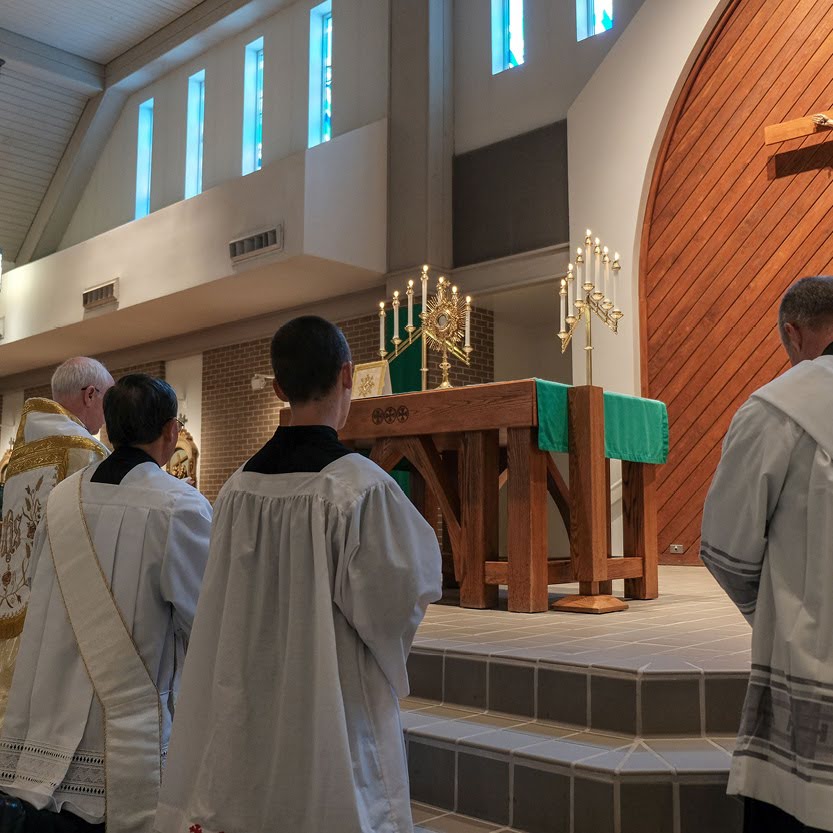“Raise up your eyes often to Heaven; and see that this life is only a passage to eternity.”
-St. Francis de Sales
If we lose our parents and friends, we ought not to be too much distressed; for there is no reason in the world why we should desire those whom we love to remain a long time here, and we ought rather to praise God when He takes them away, than be grieved at it.
In the same manner we must all, one after another, depart, according to the order which has been established; the first who leave, only find themselves the more fortunate, when they have lived with care of their salvation.
And then, in eternity, such losses are repaired, and our society, broken up by death, will be restored. This is a very sufficient consolation for the children of God, when their parents and friends have received the efficacious remedies of the holy Sacraments, before dying; which they ought always to procure without delay.
Let us keep our hearts in repose and without bitterness; but let us have courage, if there be need, to close the eyes of our dear departed one, giving him the kiss of peace. After which, let us render, without much pomp, the little honors which the Christian custom requires, according to the state and condition of everyone.
Especially, let us see that the prayers are said, and other pious exercises performed, exactly according to the intention of the deceased, for fear he may have need of some expiation through the severity of the divine judgment, that he may not be long deprived of the enjoyment of a full and glorious liberty – that his soul may not be imprisoned, through some of God’s inscrutable secrets, for a time in Purgatory, before being received into the arms of the divine goodness in Heaven.
By this last journey, friendships and associations, commenced in this world, are renewed, never more to suffer interruption. In the meantime, let us have patience, and wait courageously until the bell for our departure tolls; we shall then go to the place where our friends have already arrived, and since we have cordially loved them, that which they wished we should do, and for ourselves, that which they now desire.
However, I am on my guard against saying, “Do not weep,” for it is very just that you should weep a little, as a testimony to the sincere affection you bear towards the dear departed. This will be to imitate Jesus Christ, who wept a little over Lazarus, His good friend; but it is on condition that those exterior demonstrations should be moderate, and that those sighs and sobs should not be so much tokens of regret as marks of tenderness.
Let us not weep like those who, altogether attached to this life, consider not that we go to eternity, where, if we shall have lived well in this life, we shall meet again our dear departed, never more to be separated from them.
We are not able to prevent our poor heart from feeling the loss of those, who were here below our amiable companions; but still, we must not break the solemn resolution we have taken, to keep our will inseparably united to that of God, nor cease to say to Divine Providence, “Yes, Thou art blessed, for all that which pleases Thee is good.” I weep on such occasions, and my heart, which is like a stone on heavenly things, pours out tears over such subjects.
The imaginary insensibility of those who do not wish us to be men has always appeared to me chimerical; but, at the same time, after we have paid our tribute to the inferior part of the soul, we must do our duty to the superior part, in which is seated, as on a throne, the spirit of faith, which ought to console us in our afflictions, and even by our afflictions.
Blessed are they who rejoice in being afflicted, and who thus transform quassia into honey! God be praised! It is always with tranquility I weep, always with a great sentiment of loving confidence in Divine Providence; for since Our Lord loved death and delivered it as an object for our love, I cannot with it sill, for taking away my sisters and others, provided that they die in the love of the holy death of the Savior.
I regard this frail life as such a trifle, that I never turn to God with sweeter sentiments of love, than when he has stricken me or permitted me to be afflicted.
I presume you have so much love and fear of God, that seeing His good pleasure and His holy will, you accommodate yourself to them, and sweeten your grief by the consideration of the miseries of this world. We cannot prevent ourselves from feeling much regret at separation; and this regret is not forbidden us, provided we moderate it with the hope of not remaining entirely separated, but consider that in a little time we shall follow our friends to Heaven, the place of our repose, God showing us this mercy.
Raise up your eyes often to Heaven; and see that this life is only a passage to eternity. Four or five months’ absence will soon be over. And if our senses, amused with beholding and prizing this world and its life, make us resent a little too sharply that which is contrary to us, let us often correct this defect by the light of faith, which ought to make us judge those most happy who in the fewest days have finished their voyage.
Oh, how desirable is eternity, at the cost of some miserable vicissitudes!…Every day my soul grows in love and esteem for eternal things…Let time flow by, with which we hasten on to be transformed into the glory of the children of God…How incomparably more amiable is eternity, since its duration is without end, and its days are without nights, and its contentments are without variation!
Oh, if once we had our heart well penetrated with the thought of this holy and blessed eternity:
“Go,” we should say to our friends, “Go, dear friends, to the Supreme Being, at the hour which the King of Eternity has marked; we shall follow after you, and since time is given us only for this purpose, and the world is peopled only to people Heaven, we will do all that we can to render ourselves worthy of it.”
Yes, truly, the journey of our friends to a better life is most amiable, since it happens only to people in Heaven, and to increase the glory of our King; one day we shall go to rejoin them; and, while awaiting that day, let us carefully learn the canticle of holy love, that we may be able to sing it more perfectly in eternity. Blessed are they who place not their confidence in the present life – who esteem it only as a plank by which to pass to the celestial life, in which alone we should center all our hopes!
Let David weep over his Absalom, hanged and lost; but, over the departure of him who has accepted death willingly, who has received the efficacious remedies of the holy Church before dying, there is more occasion to be consoled than afflicted; for, having lived well, he is not dead, but saved from death, since virtuous men do not die, living in Heaven by the magnificent recompense of their merits, and on earth by the glorious memory of their good deeds.
Oh, if we could hear the sweet and amiable words of some deceased one now happy, he would say to us:
“My dearly beloved, I beseech you to consider that I am in the place which I so much desired, where I am consoled for all my past labors, which have merited for me the glory of immortality. Why do you not console yourselves with me? When I was on earth, you made profession of loving me, and sometimes seeing me succeed happily, you rejoiced and congratulated with me. Ah! Am I not always the same person? Why they are you afflicted at my departure, since God has given me so much glory? No, I desire everything else from you but sorrow and regret. If you have tears, keep them to weep over the miseries of the world, and also over your sins. Do you not know that the evils of the wretched life in which you live are such, that you ought rather to praise God for having taken me away from them than be dejected? The first who leave it, only find themselves the more fortunate, when they have lived with care of their salvation. No one is esteemed before God for having lived long, but for having lived well. A single anxiety now presses on me: it is, that you should despise, being in the body, those things of which you shall have no more need when out of the body, and that you so live amid the prosperity of the world, that you may not dread its adversity, assuring yourselves that you shall very soon meet again with your dear departed ones, never more to be separated from them through all eternity.”
Would to God that all the children of Adam reflected attentively on these beautiful words!
This article is taken from a chapter in Consoling Thoughts on Eternity by St. Francis de Sales which is published by TAN Books.







